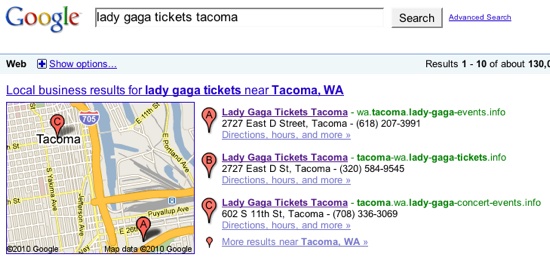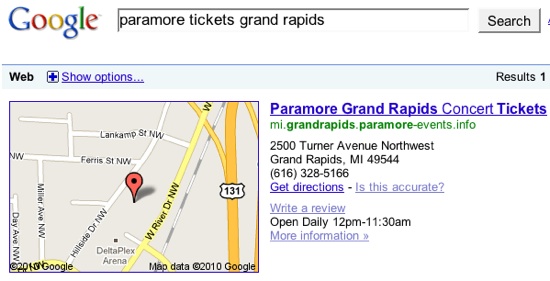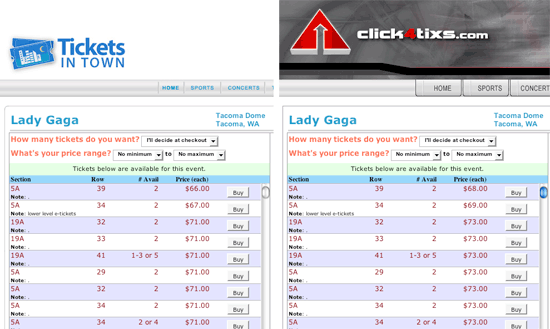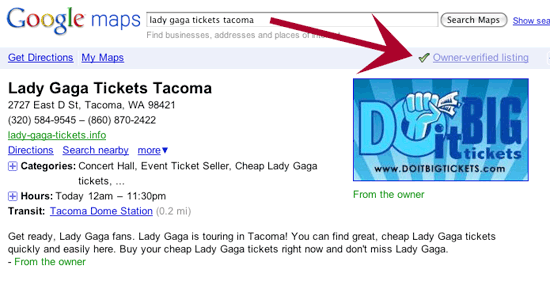Ticket Industry Spam Takes Over Google Maps
Finding tickets for your favorite concert or sporting event can be hard enough, but if your search starts with Google, chances are good that your first challenge will be getting around the veritable spamfest that ticket affiliates and second-tier ticket resellers have created. A reader contacted us last week to point out what’s going on. […]
Finding tickets for your favorite concert or sporting event can be hard enough, but if your search starts with Google, chances are good that your first challenge will be getting around the veritable spamfest that ticket affiliates and second-tier ticket resellers have created.
A reader contacted us last week to point out what’s going on. Have a look at these Google.com search results, all of which show spam-filled Google Maps Oneboxes. (Note: current search results may differ from when we took these screenshots.)
Get the picture? Google is showing local business listings, but these aren’t local businesses; they’re national ticket resellers/affiliates that have created local listings often using the street address of the venue where the concert/event is happening. There are countless similar examples across the U.S. and Canada for a variety of artist/concert-related searches. (I didn’t see any similar oneboxes on a number of sports-related searches, like baseball team tickets and NBA and NHL playoff tickets.) Let’s look a little more closely at these phony business listings.
What’s Going On?
Some person(s) or company(ies) has created local business listings in Google Maps that target local ticket searches. For more detail, we’ll use the first example shown above, a search for lady gaga tickets tacoma.
Business Name: In all three cases, the fake business name uses the exact keyword string of the search: “Lady Gaga Tickets Tacoma.” That’s the case in all the example searches above, and many others, too.
URLs: All three listings use .info domains with multiple keywords in the domain and sub-domains. The URL for Listing A points to a site called Tickets In Town; Listing B points to DoItBigTickets.com, and Listing C points to Click4Tixs.com. All three are showing the same ticket inventory in their databases (but with slightly different prices). Here’s a side-by-side look at the inventories for Listings A & C:
Other URLs we’ve seen in these phony local listings point to domains like DoItBigTickets.com and Myticketin.com, which also have the same inventory as the sites above. If you begin the ticket buying process on some of these sites, the small print often indicates that you’re buying from TicketNetwork.com, but it’s unclear if these domains are owned by TicketNetwork.com or are just affiliates.
In fact, this is where it gets a little complicated. It appears that, despite their similarities, these sites and listings aren’t related to one another. We researched the domain registrations of many of the .info URLs used in these listings. Many, like u2-concert-events.info and bon-jovi-concert-events.info have hidden registrations. But some domains have the contact information of a local search marketing company called Top Local Search.
Earlier this week, I spoke with Bill Connard, the president of Top Local Search. Connard says he was also contacted by someone in the ticket-selling industry and was accused of spamming Google Maps with phony business listings using venue street addresses. “That accusation is untrue,” Connard says.
He told me that Tickets In Town is one of his company’s clients, and that Tickets In Town owns the domain that appears in Listing A above — lady-gaga-events.info — along with other similar ticket/event-related domains. But Connard says his client isn’t related to the companies showing up in the B and C spots. He says his client hasn’t created any fake local business listings in Google Maps, and that the place page for Listing A is actually a Google mistake: a merged listing that shows his client’s logo and URL, but was created by the site from Listing C, Click4Tixs.com.
Indeed, a closer look at the place page for Listing A does appear to be a merged record: It uses the Tickets In Town logo at the top and their URL, but the email address seems to belong to Click4Tixs.com and the Photos/Videos section shows the logos of both Tickets In Town and Click4Tixs.com.
(In my experience, that’s a tell-tale sign of a merged listing. My wife’s local Google listing is very similar right now; it shows her name and photo, but another real estate agent’s phone and URL. And the Photos/Videos section shows both her and the other agent.)
Connard says he believes Google has associated his client’s logo and domain with this listing by virtue of crawling the Tickets In Town web site, which lists the Tacoma Dome address (see below) in association with the lady-gaga-events.info domain and the upcoming concert.
Address: In many cases, the phony listings use the street address of the venue where the concert is happening. In the Lady Gaga example, listings A and B — at 2727 East D Street, Tacoma — are using the address of the Tacoma Dome. You can probably guess that the Tacoma Dome has not claimed its own local business listing in Google Maps.
Listing C — 602 S 11th St, Tacoma — seems to be the middle of an intersection, a fairly common tactic in recent years of companies in other industries that have spammed Google Maps.
Phone Numbers: The area code for the Tacoma Dome is 253. The A & C listings shown above — area codes 618 and 708 — are both Illinois-based. Listing B uses a Minnesota-based area code.
Place Pages/Business Listings: While the Tacoma Dome hasn’t claimed its own business listing, the ticket sellers haven’t either — instead, they’ve created and claimed entirely new business listings using the venue’s address. The place pages show the ticket company logos and are clearly marked as “owner-verified,” meaning someone had no trouble getting around Google’s verification process, despite using the venue’s address (or an intersection) and phone numbers halfway across the country.
What It Means
Google has been holding its own against map spam lately, and even declared a year ago that it had all but eliminated the hijacking of business listings. To be fair, this widespread ticket spam in Google Maps isn’t so much about hijacked listings as it is about phony listings and what appears to be some form of automated bulk spamming.
The specifics are interesting in this case:
- It’s not small, local businesses being victimized here; it’s major entertainment venues, whose addresses are often being used for the phony local business listings — listings that are getting prime real estate on the search results page, ahead of the venue web sites and the official ticket sellers and promoters, like Ticketmaster and/or Live Nation.
- The ticket sellers are creating local business listings for businesses named “[artist] Tickets [city]” — clearly these aren’t actual business names.
- It seems that the combination of using keywords in the phony business names, as well as in the “business” URLs (the .info domains and sub-domains) are enough to trigger a Maps Onebox on highly-competitive queries.
One suspects that such a consistent pattern of abuse in this case should make it easy for Google to deal with this type of spam going forward. But until then, it’s another black eye for Google Maps.
Contributing authors are invited to create content for Search Engine Land and are chosen for their expertise and contribution to the search community. Our contributors work under the oversight of the editorial staff and contributions are checked for quality and relevance to our readers. The opinions they express are their own.
Related stories
New on Search Engine Land







